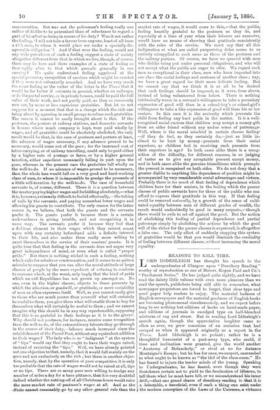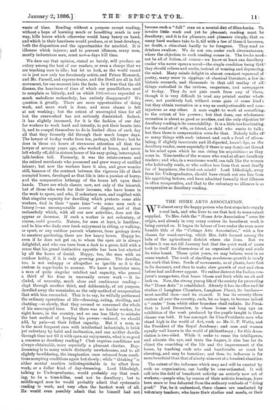READING TO KILL TIME.
T4ORD IDDESLEIGH has thought his speech to the undergraduates of Glasgow upon "Desultory Reading" worthy of reproduction as one of Messrs. Kegan Paul and Co.'s "Parchment Series." Ile has judged quite rightly, and we have read the dainty little volume with even more pleasure than we read the speech, publishers being still able to remember, what newspaper proprietors are forced to forget, that clear type and good paper help readers to enjoy. The material badness of English newspapers and the material goodness of English books are becoming phenomenal simultaneously, and we expect before long to see nothing but editions of books on hand-made paper, and editions of journals in smudged type on half-bleached mixtures of rag and straw. But in reading Lord Iddesleigh's speech again, though the appreciative laughter came as often as ever, we grew conscious of an omission that had escaped us when it appeared originally as a report in the Times. Lord Iddesleigh is no pedant ; rather he is a thoughtful humourist of a past-away type, who could, if time and inclination were granted, give the world another "Anatomy of Melancholy," or rival at no far distance Montaigne's Essays ; but he has for once,-we stispect,succumbed to what ought to be known as "the idol of the class-room." He has feared to injure the tender minds of the Young. Speaking to Undergraduates, he -has -feared, even though they were Scotchmen certain not to yield to the fascination of idleness, to tell them what he-must have felt, or we misunderstand hisinner drift,—.that-one grand charm of deaaltorpseading is =that it is . a delectable, a lameficial, even-if latch a-thing-'can exist under the modern conception-of -the Laws--of -the ,lguivevsera-viriatous waste of time. Reading without a purpose except reading, without a hope of learning much, or benefiting much in any way, kills hours- which otherwise would hang- heavy on hand; and which in their 'heaviness would produce, or at least develop°, both the disposition-and the opportunities for mischief. It is idleness which injures ; and to prevent idleness,- many men, mostly industrious men, must now,a. days kill time.
We dare say that opinion, stated so barely, will produce an outcry among the best of our readers, or even a charge that we are teaching men to idle ; but let us look, as the world round us is just now only too ferociously active, and Prince Bismarck, and Mr. Parnell, and express-trains, and the Devil are all in full movement, for one moment into the facts. Is it true that the old disease, the heaviness of time of which our grandfathers used to complain so bitterly, and on which littgrateurs expended so much melodious melancholy, has entirely disappeared? We question it greatly. There are more opportunities of doing work, and more work is done, and more shame is felt at not working ; but the extent of unoccupied time for all• but the overworked has not seriously diminished. Indeed, it has slightly increased, for it is the fashion of our day for workers to work hard and intently, to put their hearts into it, and to compel themselves to do in limited slices of each day all that they formerly did through their much longer days. The lawyer of to-day works from ten, perhaps, till four ; but he does in those six hours of strenuous attention all that the lawyer of seventy years ago, who worked at home, and never left wholly off, did in sixteen hours of his easy-going, interrupted, talk-broken toil. Formerly, it was the estate-owners and the retired merchants who possessed and grew weary of unfilled leisure ; but now the workers have it also, and grow wearier still, because of the contrast between the vigorous life of their occupied hours, developed as that life is into a passion of harry, and the comparative lethargy of the hours left upon their hands. There are whole classes now, not only of the leisured, but of those who work for their incomes, who have hours in the week- to spare, and who, if sedentary men, and ungifted with that singular capacity for dawdling which protects some able workers, find in their "spare time "—to some men such a luxury !—an' unconquerable source of disgust, and of that melancholy which, with all our new activities, does not dis- appear or decrease. If such a worker is not sedentary, of course, caelit qucestio. Nature, for man at least, is limitless ; and to him who finds ever fresh enjoyment in riding, or walking, or sport, or any outdoor pursuit whatever, from geology down to amateur gardening, there are few heavy hours. Happy he, even if he does not get on, to whom the open air is always delightful, and who can turn from a desk to a green field with a sense that his grand instinctive appetite has been but whetted by all the hours of denial. Happy, too, the man with an outdoor hobby, if it is only growing pansies. The dawdler, too, is not unhappy or altogether so ignoble as it is the custom in copy-books to assume. We knew a barrister once, a man of quite singular intellect and capacity, who passed a third of his time in unusually severe work — it in- cluded, of necessity, much close and continuous reading— slept through another third, and deliberately, of set purpose, dawdled away the remainder, as the only method of recuperation that with him succeeded. That is to say, he wilfully performed the ordinary operations of life—dressing, eating, strolling, and chatting—so slowly, that they covered or consumed the whole of his unoccupied time. Yet there was no harder worker, for eight-hours, in the country, and no one less likely to mistake the best method of keeping his powers—reduced, we should add, by pain—at their fullest capacity. But if a man, as is the most frequent case with intellectual industrials, is brisk yet sedentary by habit and inclination, and can neither dawdle through time nor fill it with open-air enjoyments, what is so good a resource as desultory reading? Chat requires conditions not alwaysobtain able, more especially a pleasant- chattee. Dap dreaming is to many minds distinctly unwholesome, and to all slightly bewildering, the imagination once released from-condi- tions accepting conditions again but slowly; while " thinking "is either mental exertion indistinguishable in its effect from work; or a duller kind, of day-dreaming, Lord Iddesleigh, talking to Undergraduates, would- probably say that read- ing,- to be a time-killer, need not be desultory ; but to middle-aged men--he would probably admit that systematic reading is - work, and very often the hardest work of all. He would 'even possibly admit that he himself had not; become-sticks " full" man on a mental diet of,-131-ushooke. To involve little- work and- yet -be pleasant; reading must be- desultory; and.it is for pleasure, and. pleasure- simply, that so many hard workers-take to it, till with a few of.them it becomes, no doubt, a stimulant hardly to be foregone. They. read as • drinkers swallow.' We do not- see, under- each circumstanoes,. where the objection to such reading comes in. The books need,. not be all of- fiCtiODI of- course—we know-at least one desultory -reader who -never opens a novel—the-single condition being that they should relieve and excite, instead of wearing and depressing, the mind. Many minds delightin almost-constant reperusal of poetry, many mere, in sippings- of- classical literature, a few-ins historic- research,, and- thousands in'. that odd- medley. of nih things embodied, in the -reviews, magazines, and newspapers- of to-day. They do not gain much from any of them,' though it- is very diffioult to read -any printed matter what 4 - ever, not positively bad, without- some- gain of some kind 3
but they obtain recreation in a wayseamobjeetionable and non.- injurious as any other. A man- ought-to work -at something/ to the extent-of hie powers ; but -thnt -done, one wholesomef recreation is about as -good- as another, and. the only objection try desultory readingis its unsociability: It is a little toofiscinating-- for the comfort of wife, or friend, or child who wants' to talk ;.
but then there is compensation 'even-for that. Nobody talks off so many things with such' interest -and such a fund of stimu-• lating, if slightly inaccurate and--ill-digested, knowledge, as the desultory reader, more espeoiallyif there-is any dominant thread in his mind upon which he can string his acquisition as they come in. Nine-tenths of the women who readat all are desultory- readers; and who, in a wearisome world, can talk like the woman
who habitually reads, or who suffers less from that most deadly foe of happiness, the tired-out mind.? Lord Iddesleigh, away from his Undergraduates, should have struck eut one line from his appetising lecture, and have admitted formally that idleness- is often recuperative, and that to the sedentary no idleness is so recuperative as desalt-soy-reading.











































 Previous page
Previous page